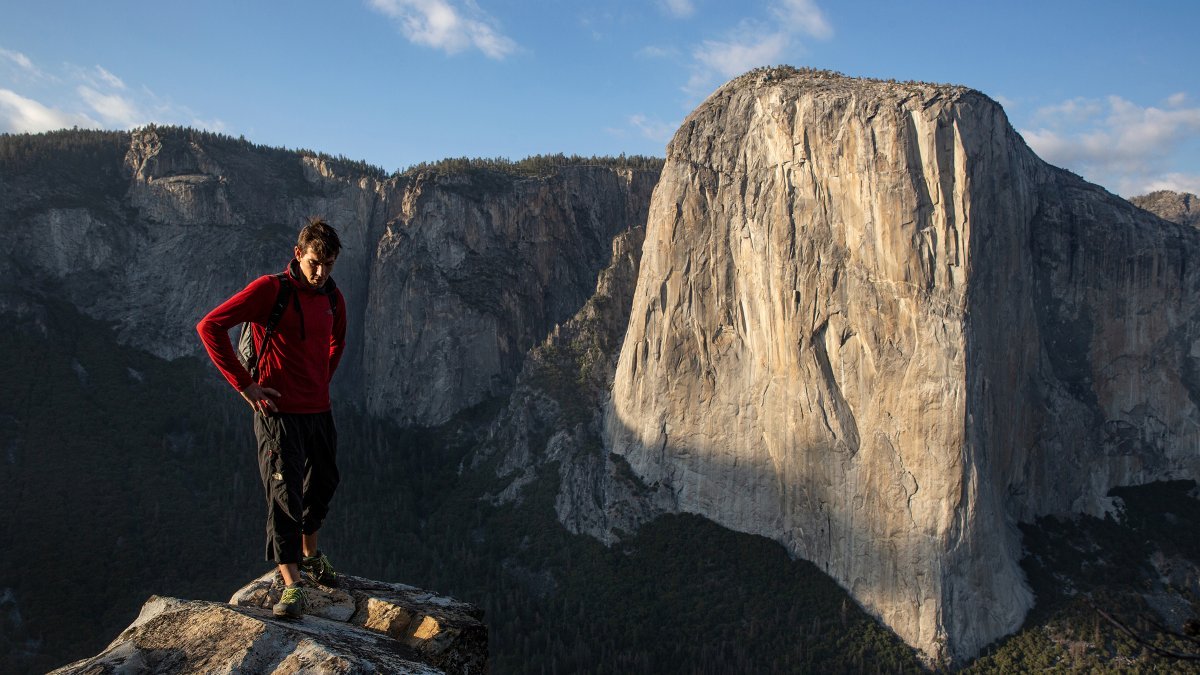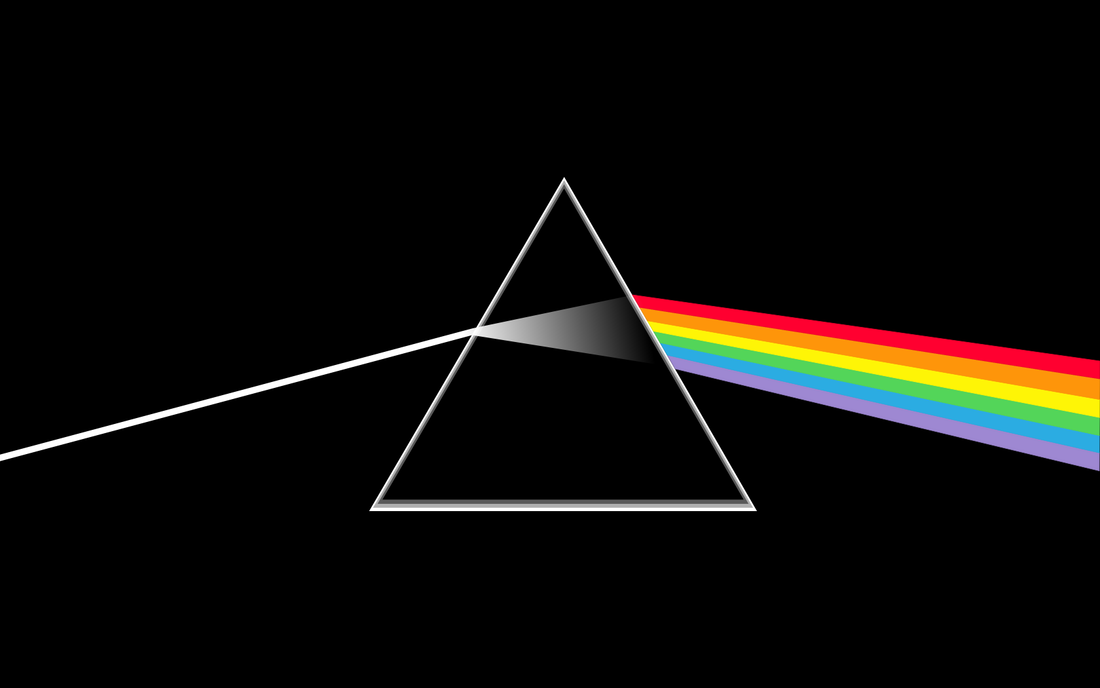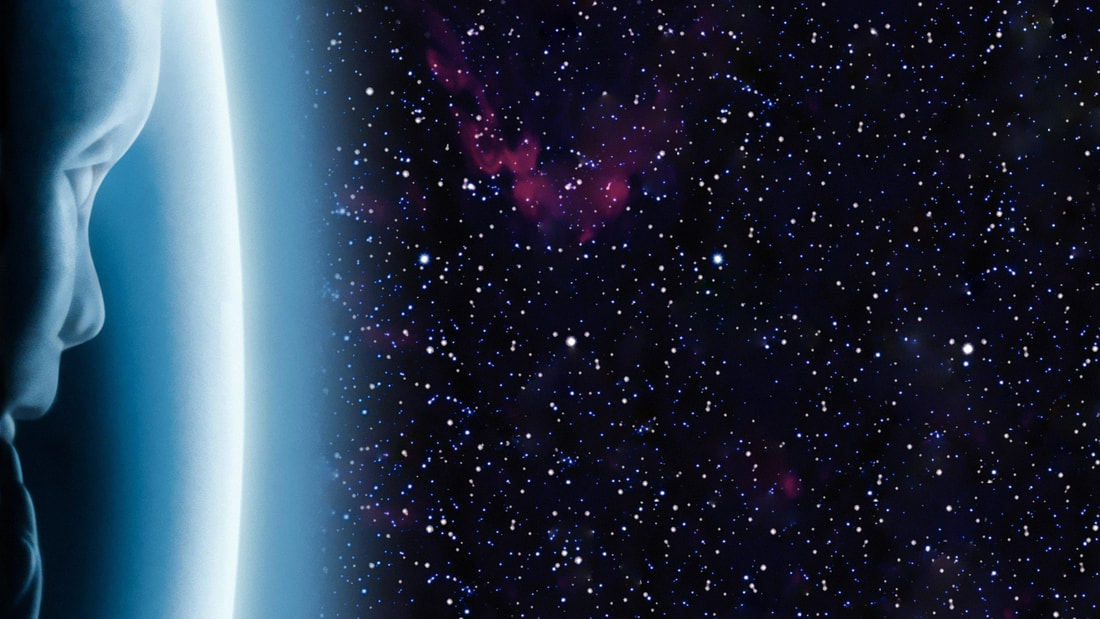 On a chilly pre-dawn June morning in 2017, a young Alex Honnold tied his shoes, left his Ram Van in Yosemite valley, walked to the face of perhaps the most breathtaking and formidable Granite Escarpment in the world, and set about to climb to the top without ropes, or a partner. He climbed 2900 feet to the top of El Capitan by his wits, his fitness, and a pair of sticky shoes. The "Free Rider" route is a 5.12d rated soul-search up a sheer wall, and The Film capturing much of the ascent grants us audience for perhaps the most significant sporting accomplishment of our time. The Documentary "Free Solo" won an Academy award for bringing us to the harrowing details. When a few guys got together to record "The Dark Side of the Moon", they did so with the simultaneous confidence of it's composition, and perhaps a bit of indifference toward whether anyone would give a shit. If they'd crashed and burned, then so be it; but their mastery and confidence came in large measure from being a creative bad-ass. It comes as no surprise that the Album Version of Dark Side charted big, and long, setting records, and sustaining for decades. It's also tough to quantify the impact rippling through the creative world as waves of music and even life-styles are shaped or readjusted from the first hearing. Is Alex Honnold's free Solo of el Cap, the ultimate YOLO, or more the "Dark Side" of Great Outdoors accomplishments? Is this epic event "The Dark Side of the Moon" of athletic achievement, slowly permeating our cultural fabric, and changing us in un-known ways. It seems a stretch to see an artistic event, such as an Album, Painting, or Film, with the same sort of 'going for broke' lens as "Free Solo". Many have achieved great things with a pair of Gym Shoes. But what of it's analog to a Great piece of art, which sustainably captivates, inspires, and forever changes the landscape of sport. When people go for broke, they generally get all sorts of attention, while we couch-surfers glare dumbfounded. Going for broke sticking your head in a lion's mouth, is one thing... but when your life is the literal downside cost of a 'super cool stunt' -- If you survive, you raise the bar a bit from idiotic stunt which gets raves on YouTube, to messianic maniac. What I'd like to know is this -- Is Alex Honnold's Solo Ascent, the Dark Side of the Moon of Adventurous accomplishment? As analog there could be a few films and a few paintings in modern history, which reshape those categories forever... Or they could have nothing whatsoever to do with this masterful climb. What remains the consistent bond between the sheer awe of a free solo of this scale and The Dark Side of The Moon, is a bit like the Moon Landing itself... That its a wholly selfish, and singular sea-change as they go for broke. Alex Honnold no more achieved his moon landing for others, than Pink Floyd composed Dark Side for me, but both were decided to appeal in their magnitude, and both set a new bar. I've read stories of Ninja's who have a true mastery of their skillset; But contrast this with thrill-seekers with a Camera Crew shooting a stunt from a perfect angle and the perfect moment to engender Awe. One is a solitary journey of refinement for the self, a search inward for something larger than ourselves, and our contemporaries. The other is a publicity stunt. In a free solo climb, perhaps It's the "not knowing the outcome" which seems to be the special sauce. If you catch the largest Walleye and throw it back and don't tell anyone, then you are clearly more mature than most. If you endeavor to scale a face alone and die trying, then the outcome and the accomplishment belong to you alone. But... if you record it, and we all witness the impact, then with time, we (the audience) may be forever influenced by it's greatness. There is no lead-in to a true 'moon-landing' -- No assured outcome that it will not go completely sideways. As we feel the gravity of what it takes to become that ninja, writing a screenplay, or designing an invention which changes our history, only history lends context to the wholeness of the accomplishment. I very much believe that those who inspire us, converting our disbelief into astonishment are not only magicians, but when we come to terms with the weight of the trick being performed, we recognize that the awe is not only deserved, but perhaps underweighted, if even inadequate. Arthur C. Clarke Once said, "Any sufficiently advanced technology is indistinguishable from Magic". What then is the wave of change when someone achieves this level of mastery? On the one hand it will inspire others to take up a sport or a guitar, and have a go at it. On the other hand, it will take time to weigh the magic's magnitude. For it is from a singular drop of inspiration that a torrent of new changes become explored. After watching A Kung Fu movie kids will emulate their heroes with a bow staff, or sword, and after "Star Wars" a light sabre, but after "Free Solo", kids who were scaling a tree beside the garage are thinking bigger. What is beautiful about capturing these moments for distribution is that they become part of our common history, and that new path changes the very course of things. There are many examples, from conquered citadels, to World Wars, where an indominible force seems to change more or less the fabric of our times. But what of the nuanced shift in history from such a seemingly smaller ripple in time. When I first Heard " The Dark Side of the Moon", or watched the Film "2001", I didn't really conceive of people making music or film, and their process or difficulties in the studio never dawned on me. I was in the audience of a masterpiece, and thought only of its texture, the grandeur and the pace. It may have been weeks or months later that I heard it again. It was several years before I re-watched "2001 A Space Odyssey", (Screened in 1968) introducing the world to, Siri, Sentient AI, The iPad, FaceTime, and the ISS, decades before they'd materialize. It's when I reconsider the brilliance, that I am humbled by the reach of such impacts. Did fifty, or a thousand Arthur Clarke prodigies hash out the details of the iPad once they saw it in Kubrick's Space Odyssey? Could Bowie write Space Oddity if it were not for Kubrick and Clarke's Collaboration? Would we wait longer for The Amazon Echo, were not HAL driving the back-end of a fictional Space Mission in 1968? What's amazing about looking to the stars, (celestial ones and not the botox sort...) is how it humbles us to dream big. Somehow boundless galaxies seem to suppress our ego if not the concept that we are center in the universe, and this may bring us the clarity to imagine beyond what we've initially dreamt possible.  While we suspend our disbelief, we don't feel Alex Honnold suffering, mentally nor physically, just the sheer magic of his accomplishment. If I never see "Free Solo" a second time, I will nevertheless find it impossible to extricate its' impact from my world view. But unlike some lessor important unnerving events, which one cannot "Un-see" -- "Free Solo" remains branded in my mind as a One-man Moon-landing. Perhaps more than the deepest free-dive, or landing a Jet in the Potomac, this film changed a cultural category, and shook the foundation of Sporting and the outdoors. It remains an open question whether we will save the National Forests from the pillage of Land Barons, and Oil Companies. But, if a bright side could be gleaned, perhaps children (dragged to see "Free Solo" with their nannies) will so revere the grandeur of El Cap, that a few of them will work to save our Natural Landmarks from becoming golf courses and strip mines. Which brings me back to "The Dark Side of the Moon", (A Piece for Assorted Lunatic's), There is a place in this world where reverence for such things could either seem strangely obsessive or duly deserved depending upon who tells you about them. I want to live in a world where a Stoner, and a Senator can debate "The Dark Side" with similar admiration, and also to discuss mental Illness with the same sincerity. That may not happen for a while, but I think it's poignant to cue the record and give a go at understanding just how much this Album has moved our musical culture forward. Partly a Catharsis to work through Syd Barrett's "madness issues" , and equally an astronomy-themed realignment of the band's celestial direction -- "Dark Side" was born to audiences in Late January 1972 at the Dome in Brighton, Four Years from the debut of "2001 A Space Odyssey". It has been said to reticent teens, that just because they don't yet listen to Pink Floyd, Bowie, or Dylan is no reason to believe that they will not. There seems to be an inescapable tractor beam for Musical influence, which will soon draw the uninitiated toward these classics. Be it a begrudging hour listening to their "Parent's Crap", in the car, or through a drug-fueled month-long bender of vintage vinyl, most teens eventually touch the 'proverbial stone' before they have their first real job. If we could prescribe Three Films, Three Albums, and Three Inventions for everyone, to spark a sea-change in their world view -- What would they be? I know of Two for sure. Just as Dark Side, or Ziggy Stardust may have been born from Kubrick and Clarke, we are perhaps richer for both. Kubrick brought us directly up to the awkwardly uncomfortable question of "What's out there", and exposed our egos to the dark insecure gravity of our meager id, against the pitch black curtain of the singularity. Alex Honnold, similarly grappling with proportional scale in his epic ascent of a titanic monolith, placed himself second to the task to overcome the odds. As Pink Floyd resolved to find a new direction without their Founder Syd Barrett, their departure to the edge of the universe and back born upon mental illness, fueled by inventiveness, brings us a brilliant score which expands the soundtrack of our lives. What remains, is to weigh what changes in the wake of Alex Honnold's Moon Landing.
0 Comments
|
Age and Treachery will overcome youth and skill. Archives
January 2024
Categories |



 RSS Feed
RSS Feed